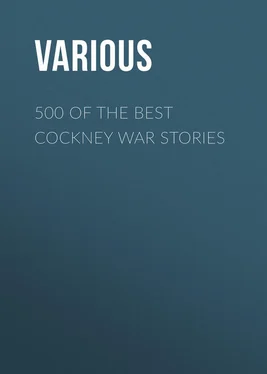Various - 500 of the Best Cockney War Stories
Здесь есть возможность читать онлайн «Various - 500 of the Best Cockney War Stories» — ознакомительный отрывок электронной книги совершенно бесплатно, а после прочтения отрывка купить полную версию. В некоторых случаях можно слушать аудио, скачать через торрент в формате fb2 и присутствует краткое содержание. Жанр: periodic, История, foreign_edu, prose_military, на английском языке. Описание произведения, (предисловие) а так же отзывы посетителей доступны на портале библиотеки ЛибКат.
- Название:500 of the Best Cockney War Stories
- Автор:
- Жанр:
- Год:неизвестен
- ISBN:нет данных
- Рейтинг книги:5 / 5. Голосов: 1
-
Избранное:Добавить в избранное
- Отзывы:
-
Ваша оценка:
- 100
- 1
- 2
- 3
- 4
- 5
500 of the Best Cockney War Stories: краткое содержание, описание и аннотация
Предлагаем к чтению аннотацию, описание, краткое содержание или предисловие (зависит от того, что написал сам автор книги «500 of the Best Cockney War Stories»). Если вы не нашли необходимую информацию о книге — напишите в комментариях, мы постараемся отыскать её.
500 of the Best Cockney War Stories — читать онлайн ознакомительный отрывок
Ниже представлен текст книги, разбитый по страницам. Система сохранения места последней прочитанной страницы, позволяет с удобством читать онлайн бесплатно книгу «500 of the Best Cockney War Stories», без необходимости каждый раз заново искать на чём Вы остановились. Поставьте закладку, и сможете в любой момент перейти на страницу, на которой закончили чтение.
Интервал:
Закладка:
Two or three American officers were attached to our brigade H.Q. on the Somme front.
We were doing our usual four days in the front line when one morning an American officer emerged from the communication trench. Just then the Germans opened out with everything from a 5·9 to rifle grenade. We squeezed into funk-holes in the bottom of the trench. Presently there was a lull, and the American officer was heard to ask, "Say, boys, where is the front line in these parts?"
"Tich," a little Cockney from Euston way, extracted himself from the earth, and exclaimed, "Strike! j'ear that? Wot jer fink this is – a blinkin' rifle range?" — W. Wheeler (late 23rd Battalion Royal Fusiliers), 55 Turney Road, Dulwich, S.E.
Imagine (if you can) the mud on the Somme at its worst. A Royal Marine Artilleryman (a very junior clerk from "Lambeff") was struggling up the gentle slope behind Trones Wood with a petrol tin of precious water in either hand. A number of us were admiring his manly efforts from a distance when the sudden familiar shriek was heard, followed by the equally familiar bang.
We saw him thrown to the ground as the whizz-bang burst but a few feet from him, and we rushed down, certain that he had "got his." Imagine our surprise on being greeted by an apparition that had struggled to a sitting posture, liberally plastered with mud, and a wound in the shoulder, who hoarsely chuckled and said: "If our typist could see me nah !" — C. H. F. (W/Opr. attached R.M.A. Heavy Brigade).
The scene was an observation post in the top of a (late) colliery chimney, 130 ft. up, on the outskirts of Béthune, during the last German offensive of the War.
A great deal of heavy shelling was in progress in our immediate vicinity, and many of Fritz's "high-velocities" were screaming past our lofty pinnacle, which was swaying with the concussion. At any moment a direct hit was possible.
My Cockney mate had located a hostile battery, and after some difficulty with the field telephone was giving the bearing to headquarters.
Faults in the line seemed to prevent him from finishing his message, which consisted of giving the map square (Q 20) being "strafed." The "Q" simply would not reach the ears of the corporal at headquarters, and after many fruitless efforts, using "Q" words, I heard him burst out in exasperation: "Q! Q! Queue! … Blimey! you know – the blinkin' thing wot the pore blighters at home wite abaht for 'mawgarine' in." — B. W. Whayman (late F.S.C., R.E.), 24 Oxford Street, Boston, Lincolnshire.
We were in a deep railway cutting near Gouzeancourt. Jerry's aeroplanes had found us and his artillery was trying to shift us.
On the third day we had run out of cigarettes, so the sergeant-major asked for a volunteer to go to a canteen four miles away.
Our Cockney, a costermonger well known in the East End, volunteered. He could neither read nor write, so we fixed him up with francs, a sandbag, and a list.
Hours passed, the strafe became particularly heavy, and we began to fear our old pal had been hit.
Suddenly during a lull in the shelling far away along the ravine we heard a voice shouting, "Ere's yer fine 'eads er salery 'orl white." He was winning through. — "Sparks," Lowestoft, Suffolk.
After my battalion had been almost wiped out in the 1918 retirement, I was transferred to the 1st Batt. Middlesex Regt. One old soldier, known to us as "Darky," who had been out since '14, reported at B.H.Q. that he wanted to go up the front line with his old mates instead of resting behind the line.
His wish was granted. He was detailed to escort a party of us to the front line.
All went well till we arrived at the support line, where we were told to be careful of snipers.
We had only gone 20 yards further when the old soldier fell back into my arms, shot through the head. He was dying when he opened his eyes and said to me, "Straight on, lad. You can find your way now." — A. H. Walker, 59 Wilberforce Road, Finsbury Park, N.4.
At the end of September 1917 my regiment (5th Seaforth Highlanders) were troubled by bombing raids by enemy aircraft at the unhealthy regularity of one raid per hour. We were under canvas at Siege Camp, in the Ypres sector, and being near to a battery of large guns we were on visiting terms with some of the gunners, who were for the most part London men.
A Lewisham man was writing a letter in our tent one day when we again had the tip that the Germans were flying towards us. So we all scattered.
After the raid we returned to our tent and were surprised to see our artillery friend still writing his letter. We asked him whether he had stayed there the whole time and in reply he read us the following passage from his letter which he had written during the raid:
"As I write this letter Jerry is bombing the Jocks, but although I am in their camp, being a Londoner, I suppose the raid is not meant for me, and I feel quite safe." — W. A. Bull, M.M., 62 Norman Road, llford, Essex.
During the defence of Antwerp in October 1914 my chum, who was wicket-keeper in the Corps cricket team, got hit in the head.
I was with him when he came to, and asked him what happened.
"Extra fast one on the leg side," was his reply. — J. Russell (late R.M.L.I.), 8 Northcote Road, Deal, Kent.
During an engagement in East Africa an officer was badly wounded. Bill, from Bermondsey, rode out to him on a mule. Whilst he was trying to get the officer away on his mule the animal bolted. Bill then said, "Me mule 'opped it, sir. 'E's a fousand miles from 'ere, so I'll giv yer a lift on my Bill and Jack (back)."
The officer was too heavy, so Bill put him gently on the ground saying, "Sorry, sir, I'll 'ave ter call a taxi." Bill then ran 500 yards under heavy machine-gun fire to where the armoured cars were under cover. He brought one out, and thereby saved the officer's life.
After the incident, Bill's attention was drawn to a bullet hole in his pith helmet. "Blimey," he said, "what a shot! If he 'adn't a missed me, 'e'd a 'it me." Bill was awarded the Distinguished Conduct Medal. — W. B. Higgins, D.C.M. (late Corpl. Mounted Infantry), 46 Stanley Road, Ilford.
We came out of the line on the night of June 14-15, 1917, to "bivvies" at Mory, after a hot time from both Fritz and weather at Bullecourt. When dawn broke we were astonished and delighted to see a "bath." Whilst we were in the line our Pioneers had a brain wave, dug a hole in the ground, lined it with a tarpaulin sheet, and filled it with water.
As our last bath was at Achiet-le-Petit six weeks before, there was a tremendous crowd waiting "mit nodings on," because there was "standing room only" for about twenty in the bath.
Whilst ablutions were in progress an aeroplane was heard, but no notice was taken because it was flying so low – "one of ours" everybody thought. When it came nearer there was a shout, "Strewth, it's a Jerry plane."
Baths were "off" for the moment and there was a stampede to the "bivvies" for rifles. It was the funniest thing in the world to see fellows running about in their "birthday suits" plus only tin hats, taking pot shots at the aeroplane.
Even Fritz seemed surprised, because it was some moments before he replied with his machine gun.
We watched him fly away back to his own lines and a voice broke the silence with, "Blinkin' fools to put on our tin 'ats. Uvverwise 'ole Fritz wouldn't a known but what we might be Germans."
Читать дальшеИнтервал:
Закладка:
Похожие книги на «500 of the Best Cockney War Stories»
Представляем Вашему вниманию похожие книги на «500 of the Best Cockney War Stories» списком для выбора. Мы отобрали схожую по названию и смыслу литературу в надежде предоставить читателям больше вариантов отыскать новые, интересные, ещё непрочитанные произведения.
Обсуждение, отзывы о книге «500 of the Best Cockney War Stories» и просто собственные мнения читателей. Оставьте ваши комментарии, напишите, что Вы думаете о произведении, его смысле или главных героях. Укажите что конкретно понравилось, а что нет, и почему Вы так считаете.












